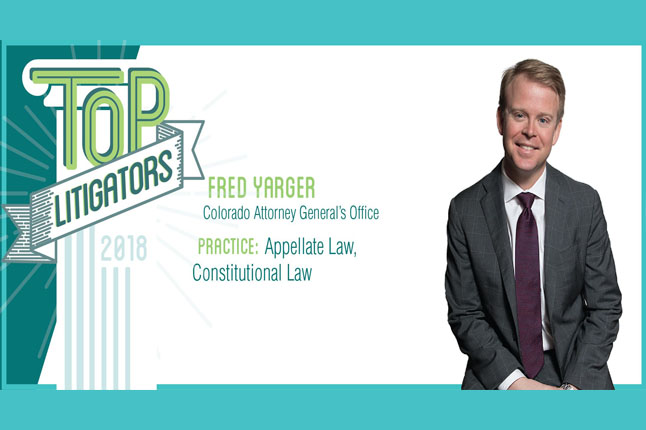
Colorado Solicitor General Fred Yarger credits a bit of luck and a hint of fate in obtaining his role within the Colorado Attorney General’s Office. And though he appreciates being able to serve the public, he didn’t always envision that he would end up here.
“It’s not like you set out and you have a plan,” Yarger said. “Or at least not always.”
After graduating from the University of Chicago Law School, Yarger clerked for 10th Circuit Court of Appeals Judge Timothy Tymkovich and Illinois federal district court Judge Mark Filip before moving into private practice. When Yarger was an attorney at Gibson Dunn & Crutcher, he had the opportunity to work on appellate-related issues, a unique opportunity that came early on.
Yarger was part of a team handling a substantial punitive damages case, one of the largest Colorado has seen. And because the case dealt with whether state laws were constitutional, he got the chance to work with former Solicitor General Dan Domenico. He landed the assistant solicitor general job in 2012.
In that role, he worked with Domenico and got insight on the solicitor general position. When Attorney General John Suthers termed out in 2015 and Cynthia Coffman took office, she appointed Yarger.
For Yarger, the most rewarding and challenging aspects of the job are two sides of the same coin — having the opportunity to explore different issues and types of cases also means having expert knowledge in many distinct areas as well.
“You get to — or have to — deal with this huge wide range of issues in that role, and it’s always something fascinating,” he said. “One minute you’re dealing with a criminal procedure issue in a case, the next minute you’re dealing with legalized marijuana and cross-border issues involving our neighbor states … so it’s really rewarding to be able to be involved in all those issues and do your best to come to good resolutions.”
One especially notable case on marijuana border issues was Nebraska and Oklahoma v. Colorado. Yarger was thrown into the case when he first started. The two states sued Colorado in 2014 over the passage of Amendment 64, which, the suit argued, was “devoid of safeguards to ensure marijuana cultivated and sold in Colorado is not trafficked to other states.”
“It was a fascinating question of states’ versus federal rights,” he said. “Obviously marijuana is still illegal under federal law, and the question is: How far can Colorado go given that federal prohibition? How do you balance those two?” The U.S. Supreme Court denied the challenge by Oklahoma and Nebraska in 2016, and the 10th Circuit Court of Appeals dismissed the challenges last year.
But the responsibility that comes with the position doesn’t escape him.
“It’s special when you get to stand up in court and say ‘I represent the state.’ I can’t tell you the number of times I’ve heard folks in our office say that. It’s unique, and it’s a great public service.”
It’s a service Yarger takes seriously, especially for cases like Masterpiece Cakeshop v. Colorado Civil Rights Commission that have the potential to make big changes with their decisions.
Masterpiece is one of the most high-profile cases involving Colorado at the U.S. Supreme Court right now. The court heard oral arguments in December. Yarger believes the court is aware that the outcome could impact a large portion of the country. He said he hopes the justices see that there are “good-faith opinions” on both sides of the debate.
“They could possibly be taking off the table legal protections that a lot of jurisdictions have debated for quite a long time. Everyone is watching,” he said. “Obviously when you’re working on cases like that, you kind of feel the weight of that broader implication and try to be aware of it while not being too aware of it so you can focus on the job and get the job done.”
The state also recently filed an amicus brief on behalf of about 40 states in a case concerning state tax collection for online transactions.
He said that type of broad agreement is rare, considering that roughly half of attorneys general are Democrat while the other half lean Republican.
“That [tax loophole] does a lot of things. It hurts state revenue but also hurts those little businesses and doesn’t create a very fair and level playing field,” he said.
Yarger said that case is one the Colorado AG’s office is proud to be part of, and as he looks ahead, he wants to ensure the Colorado office continues to be known for its top-quality work. Attorney General Cynthia Coffman announced her candidacy for governor in November, and a seamless transition is a high priority for Yarger.
“A lot of judges across the country say they really respect our office, and that’s a legacy that has gone on for multiple administrations, it would be great to carry that on,” he said. “That’s my goal over the next year … that we make sure the transition that occurs is smooth, so whoever comes in next is able to do the best work they can.”
— Kaley LaQuea

